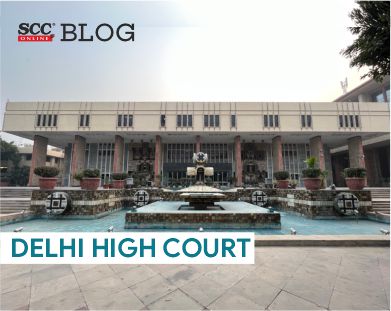Delhi High Court: A Division Bench of Satish Chandra Sharma, CJ. and Subramonium Prasad, J. dismissed an appeal of a physics teacher who was accused of sexual harassment and molestation of a Class IX girl student at a private school in 2006 and held that an act of sexual harassment can have the effect of hindering the normal social growth of the child and lead to various psychosocial problems which could require psychological intervention.
Background
The appellant was a Physics teacher at a school and the complainant was a student of Class 9 in the same school. The appellant called the complainant to the laboratory where she went with her friend, so the appellant said that ‘Oh, you have come with her, do come and see me alone on Monday or Tuesday’. Though the complainant was anxious on hearing this, she did not convey anything to anyone. The appellant even told the complainant that if she had any problem in Physics, Chemistry, Biology or even Maths, she could come to him during break or call him any time during the day or even at night. It was submitted that during this conversation, the appellant kept rubbing the complainant on her back which made her uncomfortable.
Further, at the end of the class, the appellant called the complainant and handed over one empty measuring cylinder to her in one hand, a stop watch in her other hand and when the complainant was about to leave, the appellant put his hand, in which he was carrying a steel ball, in the complainant’s upper t-shirt pocket and did not withdraw his hand and touched the complainant ‘in a bad manner’ and thus, sexually molested her. On the complaint being filed, the appellant was placed under suspension on the ground that he had exhibited lack of integrity and was involved in a conduct involving sexual harassment, moral turpitude and misbehavior towards a minor girl child which was in violation of Rule 123(b)(vii) and (viii) of the Delhi School Education Rules, 1973 (Rules). The Single Judge upheld the Order of the Delhi School Tribunal (Tribunal) and the Disciplinary Authority imposing the penalty of compulsory retirement on the appellant. The appellant challenged the Order of the Single Judge by filing an appeal before this Court.
Submissions on behalf of the Appellant
Counsel for the appellant submitted that the Order passed by the Disciplinary Authority had the signature of a person who was neither a part of the teaching staff of the school nor was an employee of the school during the relevant time. It was further stated that the inquiry was vitiated as the coram of the Disciplinary Committee was incomplete and was not in accordance with Rule 118 of the Rules.
Analysis, Law, and Decision
The Court noted that the Single Judge rejected the contention of the appellant stating that the person who had signed the Order was an employee of the school and had been sent to another school on deputation, therefore, the person would be considered an employee of the school. Further, the Court opined that “while dealing with matters relating to harassment of school going children, paramount consideration was to be given to the well-being of the child whose mental psyche was vulnerable, impressionable and in a developing stage. The long-term effects of childhood sexual harassment were, at many times, insurmountable. An act of sexual harassment, therefore, had the potential to cause mental trauma to the child and may dictate their thought process for the years to come. It can have the effect of hindering the normal social growth of the child and lead to various psychosocial problems which could require psychological intervention”.
The Court relied on Union of India v. Subrata Nath, 2022 SCC OnLine SC 1617, wherein the Supreme Court held that “the Courts should refrain from interfering with findings of facts recorded in a departmental inquiry except in circumstances where such findings were patently perverse or grossly incompatible with the evidence on record, based on no evidence”. Therefore, this Court held that in the present case, the findings of the facts were based upon evidence on record and were not at all perverse and thus, interference with the Orders of the Disciplinary Authority, the Tribunal and the Single Judge was not required.
The Court dismissed the appeal.
[Ranajit Roy v. Govt. (NCT of Delhi), 2022 SCC OnLine Del 4486, decided on 19-12-2022]
Advocates who appeared in this case :
For the Appellant: Advocate M K Sinha;
Advocate Ankit;
Advocate Deepshikha;
For the Respondent(s): Senior Advocate Puneet Mittal;
Advocate Siddharth Saxena.







